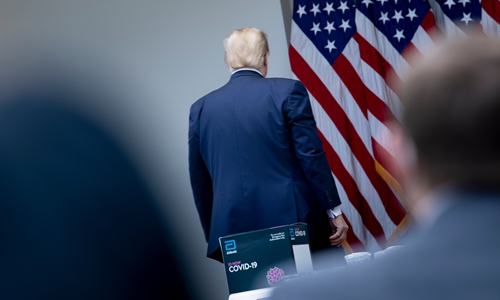China, Russia can initiate probe of US bio-labs
Washington urged to be transparent with bio-weapons program

US President Donald Trump leaves a news conference on the novel coronavirus, COVID-19, in the Rose Garden of the White House in Washington, DC on May 11, 2020. Photo: AFP
In order to hide the fact that the US is researching on biological weapons, the US will not respond to an international query on its bio-labs, Chinese military experts said, adding that China and Russia could initiate an investigation of bio-labs worldwide at the UN to pressure the US.
The US can't just claim all reasonable inquiries to its bio-labs as "conspiracy theories," and when US politicians keep accusing China's lab in Wuhan as the origin of COVID-19 without providing any evidence, they should respond to the questions on US bio-labs, including the US Army Medical Research Institute of Infectious Diseases at Fort Detrick, analysts said.
China and Russia can initiate an international investigation of all P3 and P4 labs worldwide, including the ones run by the US, at the UN Security Council, and US antiwar groups and media can also pressure Washington to be transparent on the question of its bio-labs, Chinese analysts suggested.
Washington's unwillingness to support the idea of a protocol to the Convention on the Prohibition of the Development, Production and Stockpiling of Bacteriological (Biological) and Toxin Weapons in order to create a verification mechanism makes one wonder what goals the US seeks to achieve through its overseas bio-labs, Russian Foreign Minister Sergey Lavrov told reporters on Wednesday, TASS reported.
Lavrov said at a news conference following an online meeting of foreign ministers of the Shanghai Cooperation Organization (SCO) on Wednesday that "These [US] laboratories are densely formed along the perimeter of the borders of the Russian Federation, and, accordingly, next to the borders of the People's Republic of China," the Xinhua News Agency reported.
Reasonable concerns
Song Zhongping, a military expert and TV commentator, told the Global Times on Thursday that "Russia has repeatedly voiced its concerns to the US about the labs in its neighbors like Ukraine and Georgia, but the US has ignored these concerns. The reason is simple - the US is hiding its bio-weapons program."
The US has had a very advanced capability to develop chemical and biological weapons since the Cold War, and it had used them in Vietnam, like Agent Orange, which caused serious casualties and harm to Vietnamese civilians and even US soldiers, so it is reasonable for other countries to worry what the US is doing in those overseas bio-labs, said a military expert at a Beijing-based military academy who requested anonymity.
Jin Canrong, associate dean of School of International Studies, Renmin University in Beijing, said the questions that China and Russia raised about US labs are reasonable queries, which are totally different from the groundless accusations and conspiracy theories about the origin of COVID-19 made by some US congressmen and politicians. The US accusations were dismissed by US scientists, including Dr. Anthony Fauci, and intelligence agencies.
"The US must be transparent and respond to international concerns over its bio-labs," Jin noted.
US self-isolation
In response to US Secretary of State Mike Pompeo's previous groundless accusation of the Wuhan lab, Chinese Foreign Ministry spokesperson Hua Chunying said at a press conference on May 8 that "According to open records we have access to, China has only two P4 labs, the highest bio-safety level lab, while the US has 13 that are either in operation, under expansion or in planning, according to a February report by the Federation of American Scientists."
"The US also has 1,495 P3 labs, not including many other labs it built in territories of the former Soviet Union, like in Ukraine and Kazakhstan, and in many other places around the world… the US has been the only country that has blocked the resumption of negotiations on a verification protocol to the Biological Weapons Convention," she remarked.
Song said "biological weapons research needs to be carried out in the environment and the people that the weapons might be used for. So, Russia and China, as the major strategic competitors of the US, are the targets, and that's why the US built these labs in countries neighboring its two major rivals."
"Additionally, building bio-labs overseas can avoid (impact on US territory) in a potential leak accident, and to avoid the legal problems and pressure from US media and antiwar groups," Song noted.
Song said "if the US wants to launch an international investigation into Wuhan P4 lab, China and Russia can also initiate an investigation at the UN Security Council on all labs capable of researching bio-weapons. Not surprisingly, the US will refuse as it knows it is the one who is really developing bio-weapons."
If China and Russia, the two influential UN Security Council permanent members, propose the investigation at the UN of all P4 and P3 labs worldwide, most member states will vote for it except the US, and this will embarrass Washington, Chinese observers said.
The Russian foreign minister said at the conference that "For almost 20 years, Russia and most other countries, including China, have been calling for a protocol on the convention that would establish a mechanism to verify and check states' commitment not to create biological weapons."
"The US stands almost alone against this initiative. Tensions around the issue have escalated and Washington's unwillingness to ensure transparency of its military biological activities in various parts of the world raises questions about what is really going on there and what the actual goals are," The Russian Foreign Minister pointed out.
Lavrov said that the Shanghai Cooperation Organization is preparing an action plan to ensure sanitary and epidemiological safety - specifically bio-safety - with a summit to be held this year in St. Petersburg.
Song noted that "apart from putting pressure on the US, US civilian antiwar organizations and media can also contribute to pressuring Washington to be transparent on its bio-labs."


